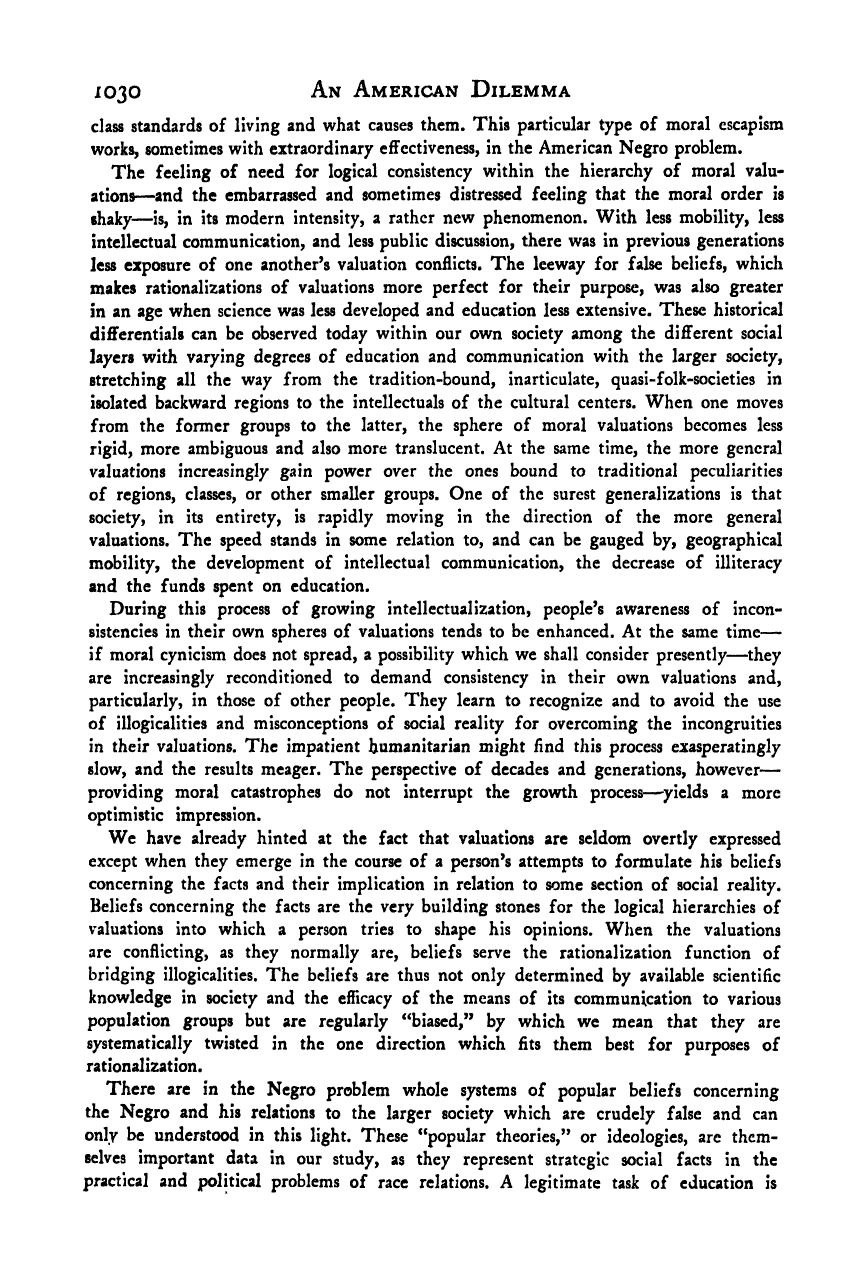Note: Gunnar Myrdal died in 1987, less than 70 years ago. Therefore, this work is protected by copyright, restricting your legal rights to reproduce it. However, you are welcome to view it on screen, as you do now. Read more about copyright.
Full resolution (TIFF) - On this page / på denna sida - Appendices - 1. A Methodological Note on Valuations and Beliefs - 1. The Mechanism of Rationalization

<< prev. page << föreg. sida << >> nästa sida >> next page >>
Below is the raw OCR text
from the above scanned image.
Do you see an error? Proofread the page now!
Här nedan syns maskintolkade texten från faksimilbilden ovan.
Ser du något fel? Korrekturläs sidan nu!
This page has never been proofread. / Denna sida har aldrig korrekturlästs.
iojo An American Dilemma
class standards of living and what causes them. This particular type of moral escapism
works, sometimes with extraordinary eflfectiveness, in the American Negro problem.
The feeling of need for logical consistency within the hierarchy of moral valu-
ations—and the embarrassed and sometimes distressed feeling that the moral order is
shaky—is, in its modern intensity, a rather new phenomenon. With less mobility, less
intellectual communication, and less public discussion, there was in previous generations
less exposure of one another’s valuation conflicts. The leeway for false beliefs, which
makes rationalizations of valuations more perfect for their purpose, was also greater
in an age when science was less developed and education less extensive. These historical
diflPerentials can be observed today within our own society among the different social
layers with varying degrees of education and communication with the larger society,
stretching all the way from the tradition-bound, inarticulate, quasi-folk-societies in
isolated backward regions to the intellectuals of the cultural centers. When one moves
from the former groups to the latter, the sphere of moral valuations becomes less
rigid, more ambiguous and also more translucent. At the same time, the more general
valuations increasingly gain power over the ones bound to traditional peculiarities
of regions, classes, or other smaller groups. One of the surest generalizations is that
society, in its entirety, is rapidly moving in the direction of the more general
valuations. The speed stands in some relation to, and can be gauged by, geographical
mobility, the development of intellectual communication, the decrease of illiteracy
and the funds spent on education.
During this process of growing intellectual ization, people’s awareness of incon-
sistencies in their own spheres of valuations tends to be enhanced. At the same time
—
if moral cynicism does not spread, a possibility which we shall consider presently—they
are increasingly reconditioned to demand consistency in their own valuations and,
particularly, in those of other people. They learn to recognize and to avoid the use
of illogicalities and misconceptions of social reality for overcoming the incongruities
in their valuations. The impatient humanitarian might find this process exasperatingly
slow, and the results meager. The perspective of decades and generations, however
—
providing moral catastrophes do not interrupt the growth process—^yields a more
optimistic impression.
We have already hinted at the fact that valuations are seldom overtly expressed
except when they emerge in the course of a person’s attempts to formulate his beliefs
concerning the facts and their implication in relation to some section of social reality.
Beliefs concerning the facts are the very building stones for the logical hierarchies of
valuations into which a person tries to shape his opinions. When the valuations
are conflicting, as they normally are, beliefs serve the rationalization function of
bridging illogicalities. The beliefs are thus not only determined by available scientific
knowledge in society and the efficacy of the means of its communication to various
population groups but are regularly “biased,” by which we mean that they are
systematically twisted in the one direction which fits them best for purposes of
rationalization.
There are in the Negro problem whole systems of popular beliefs concerning
the Negro and his relations to the larger society which are crudely false and can
only be understood in this light. These “popular theories,” or ideologies, are them-
selves important data in our study, as they represent strategic social facts in the
practical and political problems of race relations. A legitimate task of education is
<< prev. page << föreg. sida << >> nästa sida >> next page >>